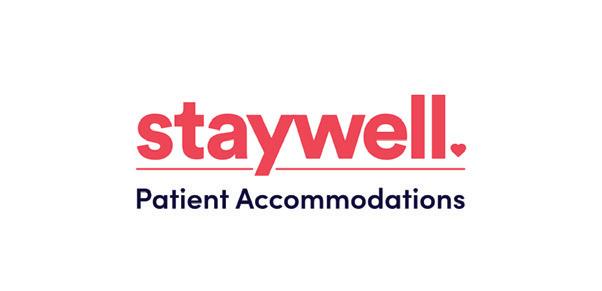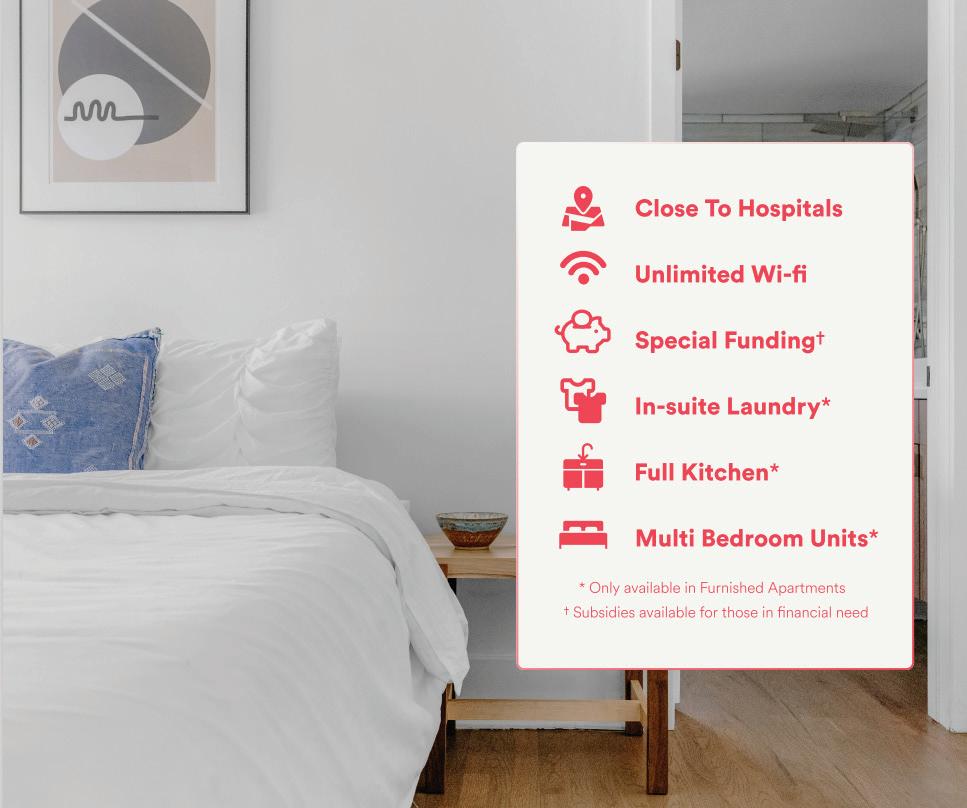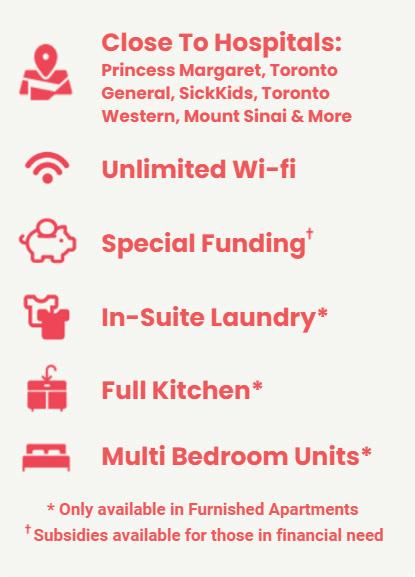My Cancer Journey
A resource for patients and their families.

To our Patients & Families:


To our Patients & Families:
Thank you for choosing Windsor Regional Hospital’s Cancer Program for your care. To start, you are not alone! You have a dedicated Care Team here at the Cancer Centre, waiting to support you through this time in your life.
Our mission is to provide outstanding care with compassion. We are grateful for the opportunity to serve you. We are committed to helping you with your needs and making your treatment the best experience possible. We invite you to watch our Patient Orientation Video. This video is found on our website at www.wrh.on.ca/cancerprogram and introduces you to the program, treatment options and other services we offer at the Cancer Centre.
My Cancer Journey has a wealth of information and resources for you and your family. It has been developed by patients, family members and our Care Team to guide you through the cancer experience and give you information and community resources that will help you along the way.
We hope you find this information helpful. We encourage you to bring it with you to appointments, use it as needed and gather information that is meaningful to you and your cancer journey. We also encourage you to be active in your care, ask questions of your Care Team, and contact us at 519-253-5253 if you have concerns about your treatment and care at any point in the journey. We look forward to caring for you.

Jonathan Foster

Dr. Sindu Kanjeekal Regional Vice President Chief, Department of Oncology

As you embark on your cancer journey, we hope the words ‘you are not alone’ will be of comfort and strength to you.
Here at the Windsor Regional Cancer Centre, is a dedicated team of people ready to help guide you through your journey.
As patients, we know how important information is at this time. We, along with team members here at the centre, have put together this guide for you to use during your journey. We encourage you to bring it with you to your appointments, along with any questions or concerns you may have.
As cancer survivors, we have been in your shoes, and we know that this is a frightening and confusing time for you and your family. Our goal is to help you as much as possible through the resources of this guide and the exceptional care at the Cancer Program.
Remember, YOU ARE NOT ALONE.




Department - Met Campus ......................... 519-254-5577 ext. 52222
............................................... 519-254-5577 ext. 52449
........................................... 519-254-5577 ext. 52317
WEBSITES
Windsor Regional Hospital Cancer Program .......... www.wrh.on.ca/cancerprogram
Windsor Regional Hospital ................................................. www.wrh.on.ca
Windsor Cancer Centre Foundation ................ www.windsorcancerfoundation.org
Windsor Regional Hospital Foundation ...................................... www.wehf.ca
The Hospice of Windsor and Essex County...........................www.thehospice.ca
Canadian Cancer Society .................................................... www.cancer.ca
Windsor Regional Hospital Cancer Centre
1995 Lens Avenue, Windsor, Ontario N8W 1L9 519-253-5253
The Cancer Centre is located on the corner of Kildare Road and Alsace Avenue.
The Cancer Centre parking and entrance are located on Alsace Avenue. The Cancer Centre is part of Windsor Regional Hospital, which is located near the major intersection of Walker Road and Tecumseh Road East.
This lot is closest to the entrance to the Cancer Centre and can be accessed from Alsace Avenue. Parking is $3 and available on a first come/first served basis. If the lot is full, please choose from one of the other available parking options. Upon entering the Cancer Centre Parking Lot.
Due to our limited parking space, the Cancer Centre lot is limited to patients on active treatment (chemo/ radiation), those seeing their Oncologist, using the Cancer Centre pharmacy lab, or accessing Psychosocial Health services.
This lot is located at the front of the hospital and can be accessed from Lens Avenue. Bring your parking ticket with you to your appointment. A staff member will stamp your ticket to validate your appointment. Validation will qualify you for the $3.00 rate as you exit the lot.
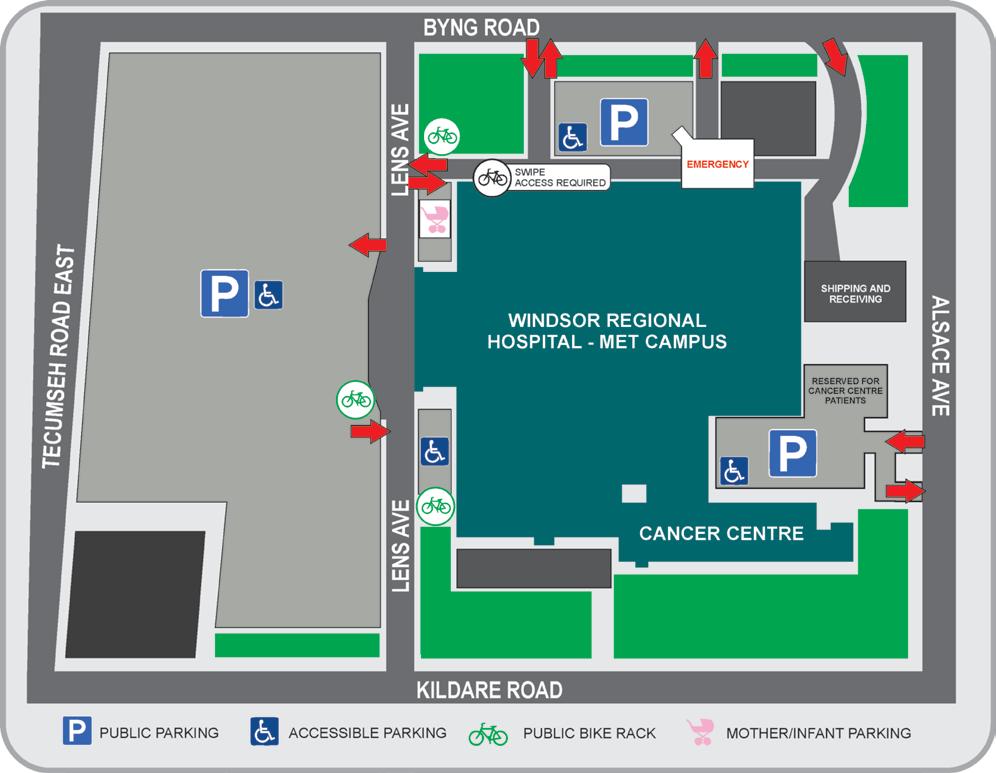
Windsor Regional Hospital’s Cancer Program offers our patients and families a broad range of cancer services. We bring together highly experienced, knowledgeable healthcare professionals with state-of-the-art technology to deliver the best possible cancer care.
Our Cancer Program includes “in-patient” services and “out-patient” services. The in-patient unit is on the 4 West floor of the Met Campus. The out-patient services are provided in the Cancer Centre.
It is not just about you getting better; it is also about making you feel better. The Cancer Centre is a beautiful 73,000 square foot building that does not have the feel of a hospital. The main lobby has a view of a peaceful garden.
The many volunteers that support the Cancer Program also help patients in important ways. They are here to provide personal assistance to you and your families, and they work behind the scenes to help us with our dayto-day operations.
We are well known for our clinical trials, research and the quality of care in our Systemic Therapy, Radiation and Psychosocial Health Services Departments. Many of the new practices we develop here in Windsor-Essex impact patient care around the world.
Our commitment to you continues across every part of the cancer journey, through diagnosis, treatment and beyond. We are here to serve you and to provide world class care, close to home.
Our Vision
Outstanding Care - No Exceptions!
Our Mission
Deliver an outstanding patient care experience driven by a passionate commitment to excellence.
Our Values
C – Compassionate
A – Accountable
R – Respectful
E – Exceptional
My Cancer Journey has been created by patients, families and our Care Team.
My Cancer Journey has also been approved by patients and families of the Cancer Program.
“Cancer Journey” is a common term used for those living with cancer. It starts from the time you are told you have cancer, through the treatment phase and into survivorship. For some, this may lead to palliative/end-oflife care or survivorship.
The cancer journey is different for each person. The road depends on many things, like your type of cancer, treatment, and your choices along the way. Many people are involved in a cancer journey, such as the person who has cancer, their family members, care partners, friends, Care Team and the community.
This guide will provide you with information to help guide you through your cancer experience. It offers you information about:
• Parking, directions, maps and hours of operation
• What to expect and what to bring to appointments
• Programs and services
• Treatment options
• Dealing with your treatment and side effects
• Next steps in your care
• Healthy eating
• Active living
• Survivorship
• Palliative and End-of-Life Care
We hope this guide will help you and your family. We welcome feedback on My Cancer Journey. If you have ideas that would help us improve it, please call 519-254-5577 ext. 58733.
Telephone number: 519-253-5253
The Cancer Program has a call centre called the Care Room. The Care Room telephones are answered from Monday through Friday 8:30 am to 4:00 pm.
You may call the Care Room for the following information:
• Ask questions about your treatment
• Ask questions about your Cancer Program appointments
• Ask for help with your symptoms
• Ask questions about your medication related to your treatment
• Ask for directions or parking information
They can also help direct you with other questions or concerns you may have about your cancer diagnosis. If you have provided permission for family members or care partners to access your personal health information, they may call the Care Room on your behalf.
The Care Room staff may be able to answer your question right away. If they are not able, they will take your information and have someone call you back within 1-3 business days.
Regional Cancer Centre
CAREchart (After Hours Contact) 4:00pm8:30am 4:00pm8:30am 4:00pm8:30am 4:00pm8:30am 4:00pm8:30am
The Windsor Regional Cancer Program (WRCP) in partnership with CAREchart@home and Cancer Care Ontario, have developed an after-hours telephone service to support you in managing your cancer related treatment symptoms.
The goal of the after-hours symptom management telephone line is to help you better manage your symptoms at home to preventing you from needing to visit the emergency room.
CAREchart@home symptom management telephone line is intended for use only after clinic hours and not during regular clinic hours. During the weekdays you should contact the oncology clinic that is providing your care.
How do I contact the service?
• Call 1-877-681-3057.
• An operator will answer your call and forward your call to a specialized Oncology Nurse who will assist you. If the Nurse is not immediately available, a Nurse will call you back within 15 minutes.
What are the hours of the After-Hours Symptom Management Telephone Line?
• Weekdays: 4:00 pm to 8:30 am
Preparing for your appointments is important. It helps get you ready to see your Care Team and makes the most of the time you have with them.
To help you prepare, the following chart shows items to bring with you when you come to the Cancer Centre.
If you have oxygen or require medication, during your appointment or treatment, enough to cover your time
or test results from other places that the Cancer Program
After checking in at the Main Lobby – Registration Desk, your first visit to the Cancer Centre may include an orientation.
You will then have a nursing assessment and a consultation with an Oncologist and/or a Nurse Practitioner, and together you can discuss the most effective care and treatment for you. At this time we strongly recommend having a family member or friend with you. They can help complete the “Patient Summary Form” and can write down the answers to your questions.
Your first consultation visit at the Cancer Centre may take up to 3 hours, which includes paperwork, orientation, and the time spent with the oncology team. Delays may happen, so it is recommended that you do not schedule other activities or appointments that day.
Care Room Mon. - Fri. 8:30 am - 4:00 pm
After Hours Contact Mon - Fri. 4:00 pm - 8:30 am
Systematic Therapy Treatment Mon. - Fri. 7:15 am - 5:30 pm
Radiation Therapy Treatment Mon. - Fri. 7:00 am - 5:00 pm
Lab Mon. - Fri. 7:00 am - 4:30 pm
Pharmacy Mon. - Fri. 8:30 am - 4:30 pm Closed 12:00 pm - 1:00 pm
Health Records & Insurance Forms Mon. - Fri. Saturdays (Closed Sundays & Holidays) 7:00 am - 5:00 pm 7:00 am - 3:00 pm
Psychosocial Health Services Mon. - Fri. 7:30 am - 5:00 pm
Telehealth Mon. - Fri. 8:30 am - 4:30 pm
Genetic Counselling Mon. - Fri. 8:00 am - 4:00 pm
In-Patient Unit – 4W Oncology 7 days 24 hours
Note: Holiday hours may vary. Please check with your Care Team for any changes.
If you have access to the Internet, you can “see inside” the Cancer Centre with a Google Virtual Tour. Go to Google Maps and do a search for “Cancer Program Windsor Regional Hospital.”
A wayfinding map is available to help you navigate through the Cancer Centre. This map can be found on our website, paper copies available on site, and posted at Cancer Centre entrances.

Scan the QR Code to view the wayfinding map.
Windsor Regional Hospital is pleased to provide wireless internet access to patients and visitors, at no charge.
The GuestWRH network requires a username (wecare) and password (wecare).
If you have trouble connecting, please contact the switchboard by dialing ‘0’.

If you live outside the Windsor Essex area, you may want to stay at Windsor Regional Hospital’s Bedside Manor while you are preparing for, or getting your treatment. It is located across the street from the hospital. The Bedside Manor offers:
• An affordable, clean and comfortable stay
• Private bedrooms – up to 2 adults per room
• Shared common areas: washrooms, living room, dining room, family room, kitchen, laundry area
• Arrangements to stay in contact with the hospital care team of a friend or family member
• Hospital security monitoring
• Convenient parking / coupons (if needed)
• The assistance of caring staff and volunteers
The Bedside Manor is also available for your family members and care partners.
The Bedside Manor locations do not provide any type of nursing care or medical procedures. They also do not allow pets.
An ATM (Automatic Teller Machine) is available if you need to withdraw money. The machine is on the 1st floor of the Metropolitan Campus at the top of the escalator from the Lens Avenue entrance.
Bedside Manor
2230 Byng Road, Windsor, ON N8W 3E3
Rates:
• Single/Double Occupancy
Reservations:
• $25.00 per room, per night
Guests are encouraged to reserve their room between the hours of 8:30 am and 4:00 pm.
For reservations or inquiries, contact 519-254-5577 ext. 52044. For weekends and after hours, call the Admitting Department at 519-254-5577 ext. 52364.
Are you here for a family member or friend who is staying at the hospital?

Are you far from home?
Do you want to stay close to the hospital?
Do you need a place like home to rest and freshen up?
COMPASSION IS OUR PASSION!



Windsor Regional Hospital has food and drink options at the Metropolitan Campus. They include:
Subway
Where: In the 1st floor cafeteria.
What: You can buy soups, salads, sandwiches, coffee and drinks.
Open: Every day from 9:00 am to 8:00 pm.
The Daily Grill
Where: In the 1st floor cafeteria.
What: You can buy hot foods, salads, snacks, coffee and drinks.
Open: Monday - Friday from 8:00 am to 6:00 pm Saturdays, Sundays and Holidays closed.
We Care Kiosk - Tim Hortons
Where: In the 1st floor cafeteria.
What: You can buy coffee, tea, drinks and baked goods (this is not a full Tim Hortons menu).
Open: Monday – Friday from 6:00 am to 11:00 pm. Saturdays, Sundays and Holidays from 8:00 am to 4:00 pm.
Cafeteria Vending Machines
Available 24 hours a day.
Meeting your needs and giving you the best care that we can are important to every worker in the Cancer Program. Please make sure your Care Team knows about any problems or questions you have so they can be of assistance.
If things do not go the way you expect, you may need more help to solve the problem. A Patient Representative can be of assistance to you and your family. The Patient Representative works to support patients and their family during their time at the hospital.
Patient Representatives improve the relationships among patients, their families and their Care Teams. They explain how to solve problems in a way that is good for patients, family members and staff at the hospital.
The Patient Representative is a neutral resource for everyone dealing with services at any campus or department of Windsor Regional Hospital.
You can reach a Patient Representative by telephone or in writing. To speak with them, contact:
Patient Representative
Windsor Regional Hospital
1995 Lens Avenue
Windsor, Ontario N8W1L9 519-254-5577 ext. 52317
A member of your Care Team can also contact the Patient Representative for you.


The Canadian Cancer Society is a Canada-wide organization. Their mission is to eliminate cancer and improve the lives of people who have cancer. They are supported by volunteers and staff in communities across Canada.
You can get thorough and trustworthy cancer information by using the toll-free Cancer Information Service and website at: Cancer Information Service: 1-888-939-3333 Website: www.cancer.ca
Trained volunteers offer free and confidential one-on-one support for people living with cancer and their care partners.
Many of these volunteers have been through cancer too. They can listen, provide hope, offer encouragement, share ideas and link you to information.
You can call them at 1-888-939-3333 or email at info@cis.cancer.ca
The Canadian Cancer Society’s Wheels of Hope Transportation Program provides people living with cancer rides to and from their cancer treatment appointments. Dedicated volunteer drivers donate their time and use their own (or Society owned) vehicles to help people living with cancer get to the hospital or cancer centre. New patients who register are required to pay an annual registration fee.
Registration and trip requests can be taken with 3 business days’ notice to book a trip.
Clients will need to register for Wheels of Hope through a member of their Care Team.
Registration Eligibility
• Client resides in Ontario
• Referred by a member of their healthcare team with client permission
• Has received a cancer diagnosis
• Is receiving treatment for cancer
• Has no other means of transportation available
• Annual $100 registration fee paid, with compassionate program available if they are unable
• Patients under the age of 18 are exempt from the fee.
PLEASE CONTACT the Canadian Cancer Society at 1-888-939-3333 or speak to a social worker or a member of your Care Team 519-253-5253 if you have any questions
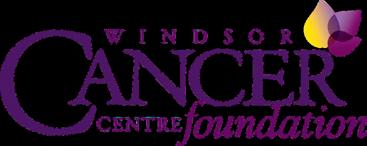
As you navigate your next steps, please know that we, the Windsor Cancer Centre Foundation and our community, are dedicated to supporting your comfort, care and treatment. During your treatment, you may encounter one or more of the programs offered below; Patient Assistance Fund, Dignity Robes, and Robes for Radiation. These programs are available because of generous donors from right here in our community. Here's a little more about these programs funded by the Windsor Cancer Centre Foundation:
Patient Assistance Fund: A cancer diagnosis can bring with it many uncertainties and unexpected expenses. The Windsor Cancer Centre Foundation created the Patient Assistance Fund to assist patients at a time when it is needed most Funds are available for emergency use when all other forms of financial assistance is not available. Speak with your Social Worker to see if you qualify.
Dignity Robes: Dignity Robes are designed to give patients comfort and control while going through radiation therapy for breast and lung cancer Dignity Robes are sewn by volunteers, free for patients, and come in a choice of colours. They open in the front and on the sides with velcro, allowing patients the control to remain partially covered during treatment.
Robes for Radiation: While waiting to receive radiation treatment, patients are required to wear a hospital gown and sit in an open waiting area with large windows The Windsor Cancer Centre Foundation provides clean, high quality robes fresh from a warming cabinet for patients to keep warm and covered while waiting for treatment.
Additionally, the Windsor Cancer Centre Foundation provides funding to support the purchase of state of the art equipment not otherwise funded by the province We are driven by a promise to serve our cancer community.
You deserve world class care close to home.
100% of funds raised stay local and support cancer awareness, research, and treatment for patients in our community. To learn more about the Windsor Cancer Centre Foundation's impact on local cancer care, or to donate, please visit www.windsorcancerfoundation.org.

Patient Bill Of Rights
You have the right to:
• Be treated with kindness and respect, with understanding of your dignity, who you are, your background and medical history.
• Privacy and care for your personal needs.
• Information about your state of health, in terms you can understand.
• Participate in decisions about your care.
• Have someone explain your treatment and tests including how they will help you, their risks and your options.
• Accept or not accept treatment, including medication, and to be told what will happen if you accept or do not accept treatment.
• Keep all information private.
• Know who your Care Team is and what they do.
• Tell us about any concerns you have without fear that this will impact your care.
• Discuss these needs with us and have reasonable and lawful attempts to have your needs accommodated if you have special needs.
• Be heard and answered if you want to tell us what you think about your care.
Patient Responsibilities
We believe that patients have a responsibility to:
• Take part with all caregivers in all their treatment and recovery.
• Give trustworthy information about their care and medical history.
• Take responsibility for what happens if they do not accept treatment.
• Be thoughtful towards their Care Team and to other patients.
• Follow hospital rules and regulations.
• Take care of their personal property.
• Take part in planning for when they go home.
• Take care of all uninsured payments.
• Voice any concerns first to the healthcare provider or the Patient Representative.
Privacy Promise - Your Personal Health Information
Windsor Regional Hospital collects, uses, shares, and keeps personal health information for:
• Direct patient care
• Administration and management of the healthcare system
• Quality improvement (satisfaction surveys) and Risk management activities
• Research, teaching, and compiling statistics
• Fundraising (name and address only)
• Complying with legal and regulatory requirements
Your personal health information will only be used for medical purposes. Windsor Regional Hospital’s Privacy Policy requires that we keep your information confidential. To learn more about how your personal health information will be used and what is being done to make sure your information is safe, please ask your Care Team. Your Care Team may direct you to the Privacy Officer for more information.
Your request for health care services implies that you agree that your personal health information will be used for specific, related purposes. Unless a new purpose is needed by law, your personal health information will not be used for a new purpose without your permission.
You may take away your permission for us to use this information at any time. Before we can do this, we must receive your request in writing.
Windsor Regional Hospital has guidelines and procedures around keeping and destroying personal health information. The details are available upon request.
You have the right to ask for and/or change your personal health information. Windsor Regional Hospital can give you a list of what has been done – or is being done – with this information. They can also give you a list of other people they have given this information to.
We encourage you and your family to ask questions about your next steps in care. We are always happy to answer your questions or will link you to another team member who can.
A caregiver such as a friend, family member or partner can accompany you to your Cancer Centre appointment to help support you.
Please review the information below for essential caregiver guidelines in the Cancer Centre:
Outpatient Treatment Appointments (Systemic Suite and Radiation): 1 essential caregiver. No children under the age of 16 will be permitted in the Systemic Suite unless by exception.
Ambulatory Care Clinic Appointments: For scheduled appointments with a provider, 2 essential caregivers may accompany the patient.
Please Note:
If your friend/family member/partner is experiencing fever, cough, runny nose, sore throat, skin rash, vomiting, or diarrhea, they should not continue with plans to accompany you at your appointment and should seek medical attention.
If your friend/family member/partner is positive for COVID-19 or has been in close contact with a confirmed or probable case of COVID-19 in the last 10 days, they should not visit the Cancer Centre.
You will need to check in at the Main Lobby - Registration Desk in the Cancer Centre before each appointment with a physician.
Please have your health card and on your first visit only, a second piece of photo identification with you that has your address on it. This will help us serve you faster.
Please let the Registration Clerk know if you have any changes in your next of kin, family physician, home address, home and cell phone numbers.
Your Symptoms Matter – General Symptoms (ESAS) and Daily Activities (PRFS)
Your Symptoms Matter is a web tool you will use to express how you are feeling based on a variety of different symptoms. It helps you and your Care Team know what symptoms you are experiencing, so together you can plan for how to make them better.
Every Care Team, including community nurses visiting patients in their home and the Care Team at the Windsor Regional Cancer Centre, uses the information you add to Your Symptoms Matter to help you.
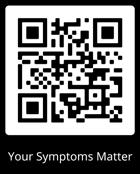
You may be asked to complete Your Symptoms Matter at home (by computer, tablet, or phone) or at the clinic (by a tablet or paper or computer kiosk). This is a questionnaire that helps you tell your Care Team how you are feeling, both emotionally and physically. Your honest answers (positive or negative) will help you and your Care Team better manage your symptoms.
Prostate patients will be asked by their Care Team to complete a different symptom screening form.
• Log onto https://isaac.cancercare.on.ca/ 24 hours before your appointment (be it in-person or virtual).
• Enter Your Health Card Number.
• Click Start
Please complete this questionnaire a maximum of 24 hours before your appointment. For example, if your appointment is Tuesday at 3:00 pm, you can complete this questionnaire any time after Monday at 3:00 pm. Visit https://www.wrh.on.ca/CancerSymptomTools for more information.
Contact your Care Team anytime if you have any questions or concerns at 519-253-5253
If this is an emergency, call 911 or go to the nearest emergency room
Your Voice Matters is a set of questions in a survey that will follow the Your Symptoms Matter screening tool at the computers, tablets or kiosks within the Cancer Centre. This survey takes on average 5 minutes to complete. It gives you the chance to share your thoughts about each visit to the Cancer Centre. The survey can be completed by yourself or your caregiver.
If you accept to complete the survey, you will not be asked to complete it again for 30 days.
You do not need to answer all of the questions. If the question is not relevant to you, select “not applicable”. If you are not sure of the answer, select “do not know.” This is your chance to share your thoughts to help make things better for patients with cancer and their families across Ontario.

The information you share in Your Voice Matters is confidential and will not be shared with your Care Team. This survey is only available electronically or within the Cancer Centre.
It is important to acknowledge that the first visit to the Cancer Centre can add to the significant emotional stress of a cancer diagnosis. We understand that the first visit to the Cancer Centre might be stressful and scary, so our staff are here to guide you through and help you complete crucial tasks to help you get started. Your Oncologist/Nurse team understands this and are focused on guiding you through this visit while completing the crucial tasks within their areas of expertise.

The Oncology Nurse gathers information and will take a detailed medical history. They may provide some general information as to what to expect during the plan of care and outline additional supportive care services that may be helpful depending on your Oncologist’s treatment recommendations. The Oncology Nurse also plays an important role for assessing any new concerns or symptoms that may be related to your diagnosis or treatment. Your Oncologist will be made aware of any concerns requiring their further assessment.
Your Oncologist reviews all of the required information from biopsies, surgical procedures, lab and imaging tests and may carry out a physical examination. The primary role of your Oncologist is to evaluate this information and determine the best treatment approach for your diagnosis. This approach includes factors related to the cancer, its stage, any other existing medical conditions and your physical ability to handle the treatment course. Treatment may even be altered depending on the severity of side effects related to treatment to balance its effectiveness without unacceptable toxicities.
The consultation appointment is, by necessity, a limited block of time. Within this visit, many details are discussed in addition to the diagnosis and prognosis including possible side effects of treatment, timeframe for their improvement, delayed toxicities that may or may not occur and how these may affect day-to-day function and quality of life. As well, there is a critically important aspect of dealing with the emotional stresses of cancer and its treatment. This includes the impact on family and work responsibilities. The role of your Oncologist and the Oncology Nurse is to acknowledge these issues and concerns and arrange any further visits or referrals to other providers to assist where possible.
One very significant concern on any patient’s mind is “What is my chance of cure and how effective will treatment be?” This can be a complex question to answer and is guided by medical data and statistical information that your Oncologist uses to provide general guidance. It is important to understand that a discussion on prognosis can be addressed in many different ways or at different points in time during the course of treatment or follow-up check-ups. Although accurate information must always be provided by the Oncologist, the details and timing of this discussion can vary based on the patient’s request or need for this information at any point in time.
In this day and age, a wealth of information is available at the push of a few keys on a computer keyboard. However, it is important that information is from reliable sources and your Oncologist is ideally suited and educated to help you interpret this information if required. A list of recommended resources can be found on our website at www.wrh.on.ca/cancerprogram.
Despite the Ontario Cancer System being of the highest quality, there will be waiting time within our system. In order to provide the best care possible, be assured that everything is done to schedule your appointments and treatment times in the most timely manner. We are always working on ways to make the process faster and we will always communicate changes.
One important aspect of cancer treatment is ensuring not only timely treatment, but a treatment plan based on best scientific evidence. Your Oncologist, by the very nature of their training and expertise, follows evidence-based treatments and guidelines for their recommendations.
Your Oncologist has the opportunity to discuss treatment approaches at multidisciplinary cancer conferences that are attended by a variety of cancer specialists in various areas including oncology, surgery, pathology, diagnostic imaging, and more. This provides, where required, input into complex cases where multiple experts provide a consensus opinion that can ensure the best evidence is used in the decision-making for cancer treatment.
Systemic therapy is a type of cancer treatment that travels through the blood to reach cells all over the body. Systemic therapy includes:
• Chemotherapy drugs (also called chemo) that kill, stop or slow the growth of cancer cells
• Hormones that change hormone levels to stop or slow cancer growth
• Biological therapies that stop or slow cancer growth
• Immunotherapy
• Targeted therapy
How does systemic therapy work?
Systemic therapy may be your only cancer treatment. You may also have surgery and/or radiation therapy. Systemic therapy can:
• Slow or stop cancer growth
• Reduce the risk of cancer coming back
• Kill cancer cells that stay after treatment, have come back or spread to other parts of your body
• Shrink a tumour before other treatments are given
• Ease symptoms, such as pain
• Help other treatments work
Your Care Team will decide and explain which systemic therapy will work best for you and your type of cancer.
There are several ways systemic therapy is given:
• By mouth in a pill, capsule, or liquid form
• By needle (liquid drugs will go right into your skin or muscle)
• By needle into a vein (liquid drugs will drip into a vein). This is called an intravenous (IV) infusion
Systemic therapy may be given in cycles. A cycle means you will receive treatment for a period of time, such as a few weeks, and then take a break from treatment. Then you will begin again, followed by a break, and so on. Your Care Team will tell you how many cycles you need.
Not all the systemic therapy will be used up in your body. Some of it will still be in your body fluids. To protect your family, you will need to follow your Care Team’s advice for a short period of time. Your Nurse may give you more details about this, depending on your type of treatment.
Once you and your Oncologist have decided on a treatment plan, you will receive a schedule with dates for treatment. A member of your Care Team will talk to you about the drugs and their side effects and how to manage them.
Most systemic therapy treatment appointments require blood work to be completed prior to treatment to see if your blood counts are at the correct level to receive treatment. Blood should be drawn and processed by the lab at the Cancer Centre. This ensures faster results and the availability of results directly through the hospital computer system.
The time a treatment takes depends on the drugs being used and can be from one hour to six hours or longer. Your treatment visits will be booked ahead of time. Each time you are at the Cancer Centre, the Clerk will give you a time for your next visit.
Thank you for being an active participant in your care and respecting the needs of yourself and other patients.
• Please have your lab work completed 24 - 72 hours before your next treatment. No lab work = No systemic therapy treatment.
• Please bring all of your current medication with you on the day of your treatment (including pain medication, insulin, etc.) that you may require during your appointment.
• Please reorder medications from the pharmacy 3 days prior to treatment.
• Please notify your Care Team if there have been any changes to your medication or medical history.
• Please set your cell phone to silent or vibrate.
• To maintain a calm and quiet environment, please refrain from accepting/making calls unless they are urgent.
• You may text message. Complimentary Wi-Fi is available. Details can be found on page 9.
• For your personal comfort you may:
• Bring a personal water bottle
• Bring your own blanket or pillow
• Bring a snack or boxed lunch
• Bring a tablet/iPad or other device with headphones
• Please refrain from eating foods which may have a strong odour as they may contribute to nausea or other symptoms for patients.
• Visitors are NOT allowed to eat in the chemo suite for safety reasons.
• A care partner such as a friend, family member or partner can accompany you to your Cancer Centre appointment to help support you.
• For Outpatient Treatment Appointments (Systemic Suite), 1 essential care partner may accompany you. No children under the age of 16 will be permitted in the Systemic Suite unless by exception.
• Windsor Regional Hospital is proud to promote a scent and fragrance free environment.
• Please refrain from wearing perfume/cologne on the day of your treatment. This applies to visitors as well.
Radiation therapy uses high energy x-rays to destroy cancer cells.
Radiation treatments are often scheduled daily for 1-7 weeks. The type of cancer and the goal of the treatment will determine how many treatments, are prescribed by the Radiation Oncologist. Even though cancer cells and normal cells react differently to radiation, it’s very hard to destroy cancer cells without damaging some normal cells too. The goal of radiation is to give enough radiation to destroy cancer cells in your body, but only enough radiation so that normal cells can recover. Side effects are related only to the area you are having treated.
Your radiation treatment team will give you instructions about any preparation you need for your daily treatments. The team consists of your Radiation Oncologist (doctor), Radiation Nurse, Clerks and Radiation Therapists. We also have Dietitians, Social Workers and Medical Physicists who are involved in your care. Your radiation treatment team will ask you questions about how you are feeling and can help you cope with your side effects. Booklets to help manage side effects are available from any member of your treatment team.
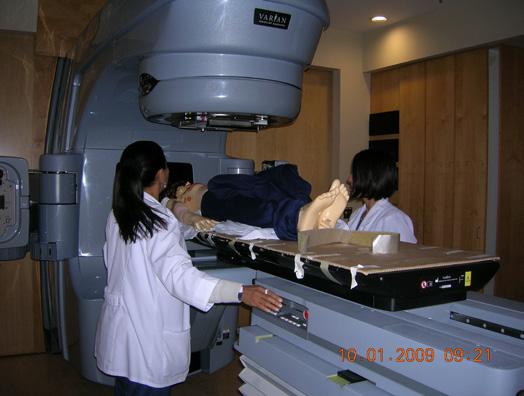
We use a specialized CT Scanner to plan your radiation treatments. It is called a CT Simulator. The CT Simulator looks very much the same as one you may have seen in the Diagnostic Imaging (X-Ray) department. During your planning session, the Radiation Therapists will determine the position you will be in for your daily treatments. We may use a special dye (through an IV injection) or a barium drink to see certain areas more clearly on the scan. On the day of your planning session, it is very important that you follow the preparation instructions that you have been given. The radiation therapy team will create a treatment plan that is specific to you.
• Go to the Radiation Reception Desk on the ground floor of the Cancer Centre. This is where the Clerk will check you in the computer. This tells the treatment team that you have arrived. Remember to bring your appointment card.
• You may need to change out of your clothes for your treatments—this information is on your radiation treatment appointment card. The Clerk will show you where to change, where to store your clothes and which waiting room to use.
• We have warm blankets and robes available for all of our patients. Ask any member of the treatment team and we can show you where to get one.
• A Radiation Therapist will come to get you from the waiting room and will explain what will happen during your radiation treatment appointment.
• Your radiation treatment visit is usually between 15-30 minutes. Most of this time is getting you positioned on the treatment table. The radiation beam is only “on” for a few minutes. The therapists will ask you to hold still and breathe normally. You do not feel anything during the radiation treatment. We may take x-rays and/or a CT scan before your treatment. These x-rays help to ensure you are in the exact position needed for your treatment. The x-rays do not give us information about how the treatment is working.
• The Radiation Therapists will leave the room to give you your treatment— they can see you and hear you at all times.
• You do not become radioactive from the radiation treatments.
• If you have any questions about your treatment or how you are feeling, you can speak to any member of the treatment team.
• A care partner such as a friend, family member or partner can accompany you to your Cancer Centre appointment to help support you.
• For Outpatient Treatment Appointments (Radiation), 1 essential care partner may accompany you.
A clinical trial is a type of research study that helps to find new ways to diagnose, treat, manage or prevent a disease. Clinical trials test new drugs, new ways to do radiation or surgery, or any combination of these.
Clinical trials help us learn about how to make cancer treatment and cancer care better. Most of the treatments prescribed by physicians went through the clinical trial process at some point; this is how it was determined that they would benefit patients.
During your appointment, members of your Care Team will talk about the types of treatments that are used to treat your type of cancer. One of your options may be a clinical trial. You will never have to take part in a trial without your knowledge or permission.
Clinical trials may give patients access to new forms of treatment. They also help our staff keep up with advances in cancer care.
If you would like to take part in a clinical trial, ask your Oncologist if there is a trial that is right for you.
You can also learn more about clinical trials online by visiting https://itstartswithme.ca/
Palliative care aims to improve the quality of life of patients who are diagnosed with life-limiting illnesses. This medical approach looks at each individual as a whole – physically, emotionally, psychologically, and spiritually.
The goal of palliative medicine is to provide education and help you and your family make proactive and informed decisions about managing your illness and symptoms. These symptoms may include pain, shortness of breath, nausea/vomiting, fatigue, loss of appetite, physical stress, or mental stress. These symptoms may come from the disease itself, or from the treatments used to treat the disease. Medication, radiation therapy, and other complementary therapies may be used to manage symptoms.
The Windsor Regional Cancer Program Palliative Care Team is made up of specialized Physicians and Nurses who work very closely with your larger Care Team, including Oncologists, Social Workers, Dietitians, home and community care workers or other community service providers. Our Palliative Care Team works to understand your concerns, needs, and wishes, and creates an environment in which you feel comfortable asking questions and actively participating in your own care. Once symptoms have been well managed, many people experience an improved quality of life and reduced anxiety.
Goals of Care clarifies a patient’s values, wishes, and goals regarding their treatment. The process aims to clarify a person’s illness understanding and more specifically, their wishes. Advanced care planning should begin early in a patient’s course of care. Your Physician may discuss your Goals of Care at your first appointment or sometime during your care journey. The Goals of Care Designation Order follows the patient in order to guide all healthcare providers. As such, your Goals of Care may change as you go through your cancer journey. We encourage you to review your Goals of Care with a Care Team member at any time.
Goals of Care Designations involve many options and should be discussed and considered carefully. Whether care involves resuscitative care, medical care, or comfort care, there are many considerations. Although at times, these decisions may be difficult to think about, it is important that Goals of Care are clear and documented. This most often puts minds at ease and positions the patient and their wishes at the centre of care. It can also reduce stress on family and loved ones when the patient’s wishes are clearly communicated and in place.
For additional information, including frequently asked questions, please visit the main Windsor Regional Hospital website at www.wrh.on.ca/GoalsOfCare.
Every patient has the right to make their Goals of Care choices known. Please discuss your or your loved one’s Goals of Care with your healthcare provider.
Unscheduled/Drop-in visit:
In order to give all of our patients the best care possible, we need to carefully organize the clinic schedules. As such, the Cancer Program is unable to see you unless you have an appointment. Thank you for understanding.

If it is an emergency, go to the closest emergency room. Make sure you tell the staff that you are a patient at the Cancer Program.
If you have a cancer related health concern (or if you have a health concern related to your cancer diagnosis), and it cannot wait until your next visit, please call the Care Room at 519-253-5253. Telephones are answered Monday through Friday from 8:30 am –4:00 pm by Care Room Clerks. The Care Room will give your message to your Care Team. Calls are answered in order of importance. You will be called back within 1-3 business days.
If you have a cancer related health concern outside of the above hours or on a weekend/holiday, call CAREpath at 1-877681-3057. Please refer to the Care Room details on page 7 for more details and information on who to call and at what time.
Please note that you will not receive a call from your Care Team with normal test results. The Care Team, however, will contact you directly if a test ordered by an Oncologist comes back abnormal. If you need a cancer related prescription renewal, please let your pharmacy know at least 3 business days before your prescription runs out. If required, the pharmacy will contact the ordering Oncologist. For health concerns unrelated to your cancer diagnosis, please contact your Primary Care Provider. If you do not have a Primary Care Provider, please let your Care Team know so that they can help you locate one.
If you cannot attend your scheduled visit, please let us know as soon as possible and/or 48 hours prior to your scheduled visit. Clinics are scheduled well in advance, so you may need to wait 6 – 8 weeks for another visit.
After your treatment is completed, your follow-up care will be arranged. The follow-up visit is to find out how you are feeling and talk about any concerns you have about your cancer or treatment.
Should you have any questions or concerns before your appointment, please feel free to contact the Care Room or to discuss them at the time of your visit. We encourage patients to write down questions before the appointment to ensure they remember them.
The Windsor Regional Cancer Program sends a copy of your file to your Primary Care Provider and to the doctor who referred you to the Cancer Program. You can change these directions at any time.
We suggest you keep close and regular contact with your Primary Care Provider during your cancer treatment and after it is finished. Please tell the Cancer Program if you change your Primary Care Provider.
when you see your doctor, nurse, or pharmacist.
Keep your medication record up to date.
Remember to include: drug allergies vitamins and minerals herbal/natural products all medications including non-prescription products
Ask your doctor, nurse or pharmacist to review all your medications to see if any can be stopped or reduced.


There is a Pharmacy located in the Cancer Centre for cancer patients. All Cancer Program patients are encouraged to use the WE Care Pharmacy for their treatment related medications, including anti-nausea medications and oral anti-cancer medications.
Benefits include:
• Dedicated team of Pharmacists and Pharmacy Technicians with expert knowledge of cancer treatment medications
• Assistance in managing side effects from treatment
• Excellent working relationship with the Physicians at the Cancer Program
• Dedicated Drug Access Coordinators to assist patients with insurance and coverage for medications
All oral anti-cancer medications are prescribed electronically and submitted directly from the Physician’s office to the We Care Pharmacy. If you are being treated with an oral chemotherapy agent, the prescription goes through a detailed safety check by the Pharmacist. This check is very thorough, including reason for taking the medication, drug-drug interaction checks, lab values, etc. This detailed check can also be time consuming. For this reason, and to ensure your utmost safety, oral chemotherapy prescriptions at WE Care Pharmacy may take up to an hour to be thoroughly checked before being provided to you.
Our Pharmacy Technicians have detailed information about drug plans. Please talk to them or other members of your Care Team if you have questions about drug costs and coverage. Our Drug Access Coordinator will work closely with you and help you find all the ways that are available to cover these costs.
If you are getting your refill at your local pharmacy, you will need to contact your pharmacy 3 business days before you will run out of the medication. Pain medication refills need to be placed by Thursday so you do not run out of them over the weekend.
Oncologists and Nurse Practitioners are only able to renew prescriptions they have written. All prescriptions for narcotic medications will be faxed directly to your pharmacy.
Hours and Location:
• Cancer Centre Lobby, just off the elevators.
• Hours: Monday-Friday 8:30 am – 4:30 pm. Closed 12:00 pm - 1:00 pm.
• Delivery service and curbside pickup is also available. Please call 519-253-5253 ext. 58529 for more information
There is a lab located in the Cancer Centre where you should have your blood drawn 24 - 72 hours before your systemic therapy treatment.
Please ensure that you arrive at least 10 minutes before the close of the Lab, in order for your labs to be drawn.
Hours and Location:
• Cancer Centre, Ground Floor, Around corner from ground floor registration desk.
• Hours: Monday - Friday: 7:00 am - 4:30 pm.
• The lab may be closed on holidays. Please check with your Care Team before coming on a holiday.
Please note, the Cancer Centre Laboratory cannot take lab requests from healthcare providers outside of the Cancer Program.
Our Psychosocial Health Services team provides free and confidential support to patients and their families/ care partners for practical, emotional and nutritional concerns to help with adjusting to cancer.
A cancer diagnosis is hard on both you and your family. Often, individuals have many questions and feelings, such as anxiety, depression or distress. The cancer journey also affects everyday life like work, money and the need for more healthcare supports. The Cancer Program’s Social Workers can help you with this.
Our team of experienced professionals can help with any of the following:
• Anxiety, depression or distress
• Coping
• Money concerns
• Sexual concerns related to cancer including body image, intimacy and relationships
• The need to learn more about next steps
• The need to talk to someone outside the family
• Advocacy support
• Counselling and dealing with a crisis
• Dealing with the healthcare system
• Filling out paperwork and forms
• Programs to help you with financial assistance
• Quitting smoking
• Showing you community resources and support groups
• Talking to children or teens about your cancer
• Care partner support
Eating healthy and making sure you do not lose weight are very important. Eating well can help you feel better. Cancer and cancer treatment might make it harder to eat or make you feel less hungry. Our Registered Dietitians can help you with this. Registered Dietitians can help you with:
• Problems chewing or swallowing
• Constipation
• Diarrhea
• Feeling less hungry
• Nausea or throwing up
• Gas or bloating
• A sore or dry mouth
• Taste changes
• Weight loss because of cancer or treatment
To see a Social Worker or Registered Dietitian, please ask your Care Team. You can also call the Cancer Program Call Centre at 519-253-5253.
Any patient can get these services once they have been referred and registered at the Cancer Program. Emotional support is also available for family members.
If you are a patient on the In-Patient floor (4 West) speak to your Nurse about these services.
Quitting smoking and staying smoke free is one of the best things you can do for your health and cancer treatment. Whether you are scheduled to have surgery, radiation or chemotherapy, quitting smoking will help you. Even reducing the number of cigarettes you smoke will help.
Remember, it is never too late to quit. Quitting smoking also reduces the chance of your cancer coming back or getting another form of cancer.
At the Cancer Program, we are committed to providing you with the best possible care for you cancer. During your time here, should you be identified as a smoker, please expect to receive a call from a member of your Care Team. This team member will offer you a variety of smoking cessation support and information about community resources to help you become/stay smoke free. Our expert, specially trained Social Workers are able to provide counseling to help you quit/stay smoke free while connecting you with other resources to help.
For more information, please call 519-253-5253 from Monday through Friday, 8:30 am to 4:00 pm.
Information is available from Cancer Care Ontario at: www.cancercareontario.ca/en/Quitting-Smoking.
If you require access to your medical records or insurance forms to be completed, please see the Health Records Department. The Health Records Department is in the Main Hospital located on the ground floor, near the fracture clinic. A staff member will get any information that is needed and make sure the Oncologist gets the forms that need to be filled out.
A signed consent form to allow sharing of your health information is needed. The Oncologist can take up to 30 days to fill out the form. Once it is filled out, most forms will be mailed to the company and a copy will be kept with your health record chart at the Cancer Centre. Some Health Record services have costs. The staff member will be able to tell you more.
While you are being treated for cancer, there may be forms such as insurance, disability or sick forms that need to be filled out and signed by a doctor if you would like to apply for health benefits.
If you need your doctor to fill out your form for you, bring the form to your appointment. Your Care Team will send the form to Health Records who will then contact you when it is ready for pickup.
ConnectMyHealth is a digital health solution that provides you with an online, single access channel to view your health records from participating hospitals in Ontario Health West Region. ConnectMyHealth can be used on desktop and mobile devices, there’s no cost to use it, and there’s no app to download when accessing your account. Visit the What is ConnectMyHealth webpage for more information about what ConnectMyHealth is, and can do, to help empower your health journey.
Scan the QR code to register.

It is important that you understand your care and treatment. If you need a translator or are hard of hearing, please speak with your Care Team.
We have VOYCE Interpretation Services or direct translation if you need it. You or a family member may speak to your Health Care Team for more information.
If you are hard of hearing and would like interpreter services, speak with your Care Team so that this can be arranged for you.
Windsor Regional Hospital’s dedicated in-patient unit on 4 West serves those patients with cancer who need to be hospitalized. The in-patient unit helps patients who have been newly diagnosed, those who are getting treatment, and those who need follow-up or end-of-life care.
Your Care Team may include:
• Nurses
• Doctors
• Nurse Practitioners
• Unit Clerks
• Pharmacists
• Respiratory Therapists
• Registered Dietitians
• Chaplains
• Registered Social Workers
• Physiotherapists
• Occupational Therapists
• Volunteers
Transition to Betterness (T2B) offers a Concierge Service for patients and their families with many different daily services that help make your stay with Windsor Regional Hospital more comfortable. Their generous free services include:
• Windsor Regional Hospital parking passes
• $2 Tim Horton’s Gift Cards
• Windsor Regional Hospital Meal Cards
• The Windsor Star newspaper
• iPads and laptops for you to use Concierge Service Hours:
• Monday-Friday 11:00 am – 1:00 pm and 4:00 pm – 7:00 pm.
• Visit the Concierge Desk on 4 West, or dial extension 4T2B (4822).

The Ontario Breast Screening Program is a province wide organized cancer screening program that provides high-quality breast cancer screening throughout Ontario to 2 groups of women. Ontario Health (Cancer Care Ontario) is pleased to announce that on October 8, 2024, the Ontario Breast Screening Program (OBSP) will be expanding to offer breast cancer screening to people ages 40 to 49. As part of expansion, people ages 40 to 49 will be able to self-refer to the program. People ages 30 to 69 who are confirmed to be at high risk of getting breast cancer be screened once a year with a mammogram and breast magnetic resonance imaging (MRI). Individuals should talk to their Primary Care Physician to determine if they are eligible for a referral to the High Risk Ontario Breast Screening Program.
Individuals over 40 can book their own mammogram at: *Please note: OBSP Screening Program sites may periodically change.
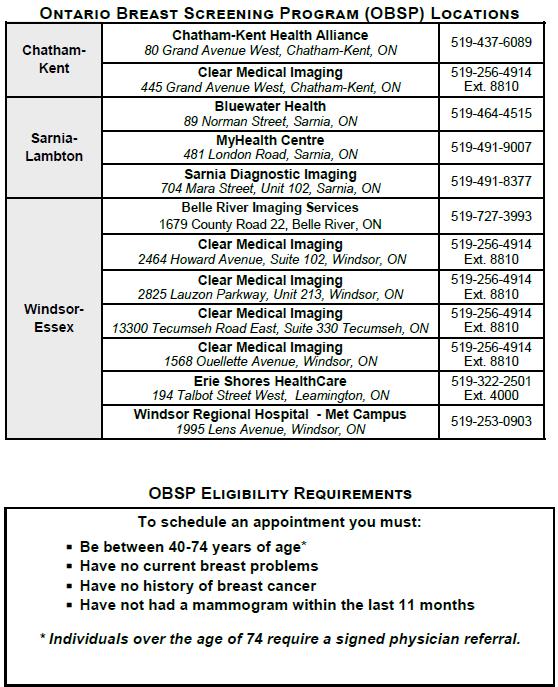
Cervical cancer is almost entirely preventable through regular Pap Tests and the HPV vaccination. The Ontario Cervical Screening Program recommends that anyone with a cervix (women, transmasculine and non-binary people) who is or ever has been sexually active have a Pap test every 3 years starting at age 21. But we are in the process of updating this recommendation. If you are under 25, talk to your family doctor or nurse practitioner about whether you should wait until age 25 before starting cervical screening with the Pap test. Sexual activity includes intercourse, intimate touching or oral sex, with either men or women.
A Pap Test is done at your Primary Care office. Your results will tell you if you need to have another Pap test or if you need to see a specialist. If you don’t have a Primary Care Provider, make an appointment at your local health unit. The HPV vaccine is recommended for all individuals 9 to 26 years of age.
For maximum protection, people should get the vaccine before becoming sexually active and, ideally, around age 11 or 12 (grade 7). The vaccine is free of charge to all boys and girls in Grade 7 through the school based clinics. Those who missed the shot in Grade 7 are eligible to catch up missed doses through the local public health unit, free of charge until the end of Grade 12. If you’d like to get the HPV vaccine – and you’re under 26 – speak to a primary health care provider or local public health unit. The vaccine can be purchased privately with a prescription and may be covered through private insurance. Individuals 27 years of age and older who are at ongoing risk of exposure to HPV may receive 9vHPV vaccine with shared decision making and discussion with a healthcare provider.
This screening program indicates that all Ontario men and women aged 50 - 74 should be tested for colon cancer. Those at average risk for colon cancer should do a simple home test called the Fecal Immunochemical Test (FIT) every two years.
For a colon cancer screening kit, talk to your Primary Care Physician. Those at a higher risk for colon cancer may need a colonoscopy instead of the at home FIT test. To find out if you need a colonoscopy, talk to your Primary Care Provider. If you do not have a Primary Care Provider call Telehealth Ontario at 1-866-828-9213.
To learn more, visit: www.cancercareontario.ca/en/get-checked-cancer or contact 1-866-662-9233 or screenforlife@cancercare.on.ca.
Almost half of primary cancers could be prevented. A healthier lifestyle can often help reduce the chance of a recurrence or secondary cancers. How to lower your risk:
Be Smoke Free
• Smoking is the biggest cause of cancer.
• Not smoking lowers your risk of lung, esophageal, kidney, mouth, throat, stomach and pancreatic cancers. Move
• Exercise for at least 30 minutes every day.
• Work a goal, like brisk walking, into your routine.
• Think of exercise as an appointment you can’t miss!
Eat Healthy
• Eat a variety of vegetables and fruit daily.
• Limit red meat (beef) to 18 ounces or 500 grams per week.
• Avoid processed meats like hot dogs, bacon and lunch meats.
• Enjoy high fibre foods like whole grains, lentils and legumes often.
• Limit salty foods and foods processed with salt.
• Do not add salt at the table.
• Speak to your healthcare provider regarding supplements.
• Avoid sugary drinks.
Stay at a Healthy Weight
• Aim for a body mass index (BMI) between 18.5 and 24.9
• Aim for a waist that is less than 88 cm (35 inches) for women and less than 102 cm (40 inches) for men.
Do Not Drink Too Much Alcohol
• Men, no more than 2 drinks per day.
Do Not Stay Out in the Sun Too Long
• Women, no more than 1 drink per day.
• Try not to be exposed to ultraviolet or UV rays from the sun, especially when outdoors for a long time for things like golfing, gardening, playing baseball or fishing.
• Talk to your doctor about any changes to your skin.
• Wear sunscreen with SPF of 30 or more.
• Wear UV protecting sunglasses.
• Try to stay in the shade.
Our Genetic Counsellor provides services to patients who are concerned about their personal and family history of cancer. Speak to your Oncologist or Primary Care Provider if you think your family history of cancer is significant.
The Genetic Counsellor reviews your family history to see if your cancer might have a hereditary cause. This information can be helpful when making medical decisions and managing your risk of getting cancer for both you and your family members.
How do I make an appointment?
We can only accept patients sent to us by Oncologists and other healthcare providers. You should talk about your concerns with your Primary Care Provider or Oncologist and they can refer you for genetic testing if appropriate.
The Indigenous Patient Navigator can assist patients families and/or care partners in overcoming barriers in a culturally appropriate manner. The Indigenous Navigator can offer support and provide resources to help individuals make informed decisions.
The Indigenous Patient Navigator can:
• Provide you with support at clinic visits
• Help you and your family communicate with Oncologists and Nurses
• Help with traditional medicines, ceremony, or spiritual/cultural needs
• Help you find services
• Help you connect with Indigenous knowledge practitioner
How to contact The Indigenous Patient Navigator:
• Ask any member of your Care Team at the Cancer Program
• Call 519-254-5577 ext. 58504
• Call toll free: 1-844-904-2273
• or visit: www.wrh.on.ca/IndigenousHealthandWellness where you can find contact information or submit an online referral form.
For some appointments, you can meet with your Oncologist or another Physician using the phone or video technology instead of coming to the Cancer Centre.
What happens during a Virtual Care appointment?
A Virtual Care appointment is an appointment done by video or by telephone. Options available include:
• a simple phone call
• a video call (for example, on FaceTime or Zoom)
• a video conference using the Ontario Telemedicine Network (OTN)
If your appointment is at home, you will be called on the phone or by video call. If your appointment is at the Cancer Centre, it will be done using OTN with a Nurse present during your appointment. OTN is often used to connect with a Physician who is either not at the Cancer Centre and/or outside of our region.
How does this help you and your family?
Virtual Care appointments can save you time and money coming to the Cancer Centre. It also allows for participation and involvement of out-of-town family members who you wish to be included in your care.
Can I use Virtual Care for my appointments?
Ask your Care Team if a virtual care appointment is appropriate for you. If yes, your Care Team will provide you with instructions on how to attend your appointment and by which option.
Patient Education plays a major role in empowering patients and families with cancer. Educating patients about their disease, treatment, management of symptoms and quality of life can reduce anxiety, strengthen coping skills, encourage participation in decision making and improve the experience for patients and families. Our program works to create new and better ways for patients to get the information they need and at the time they need it. The right information at the right time is a key philosophy for us. This requires patient and family involvement with how our educational materials are developed and delivered. Patient and family input is essential to how information is communicated and we try to build it into everything we do. We are proud to say that all new educational materials are patient reviewed and patient approved. If you are looking for information online, visit the Cancer Program website at www.wrh.on.ca/CancerProgram. The website gives you information about the Cancer Program, our services and information about cancer, treatment and how to deal with side effects. You can also get information from the Canadian Cancer Society by visiting their website at www.cancer.ca or calling 1-888-939-3333. Please speak to your Care Team if you are looking for any specific resources.
For detailed information regarding your Brachytherapy treatment, please visit our website at www.wrh.on.ca/CancerProgram to watch the informational videos. These videos are for patients and their families who are getting HDR Prostate Brachytherapy or LDR Prostate Brachytherapy.

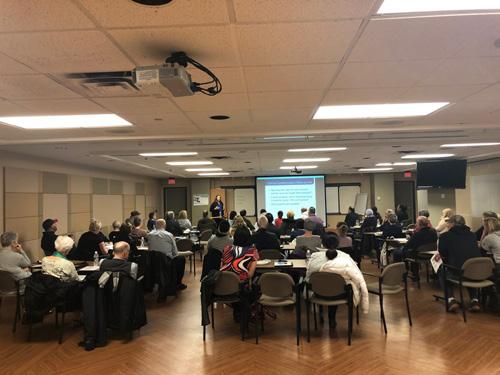
RENEW is a wellness program hosted by the Cancer Program. The program has been designed for participants at any point in their cancer journey. It consists of an educational series on general survivorship, nutrition and eating healthy, active living and exercise, sexuality and cancer, and a cancer genetics and family tree workshop. Please visit www.wrh.on.ca/RENEW for class times, locations and schedules. For more information, please email renew@wrh.on.ca or call 519-254-5577 ext. 58733.
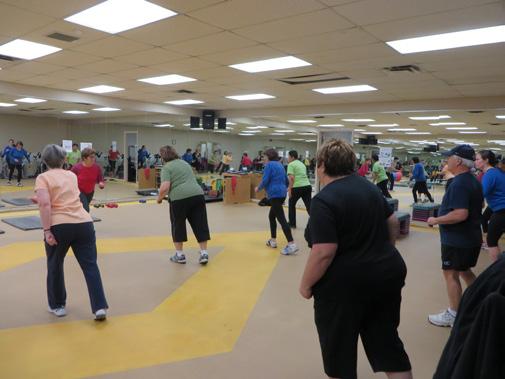
Cancer can cause side effects from treatment or symptoms. Cancer Care Ontario has created 23 patient guides to help you and your loved ones manage your symptoms. The guides are filled with easy to understand, practical tips for what you should do and when to get help from your Care Team. The guides are available for download in English, French, Italian, Spanish, Tamil, Simplified Chinese and Traditional Chinese: www.cancercare.on.ca/symptoms
Your Care Team can also provide you with a paper copy of these guides:
• Anxiety
• Bone Health
• Bowel Function –Prostate Cancer
• Constipation
• Delirium
• Depression
• Diarrhea
• Dyspnea (Shortness of Breath)
• Exercise
• Fatigue
• Fever
• Hand-Foot Syndrome
• Hormonal Symptoms
• Loss of Appetite
• Low Platelet Count
• Nausea and Vomiting
• Neutropenia (Low Neutrophile Count)
• Oral Care (Mouth Care)
• Pain
• Sexual Health
• Sleep Disturbances
• Urinary Incontinence –Prostate Cancer
• Urinary Problems –Prostate Cancer
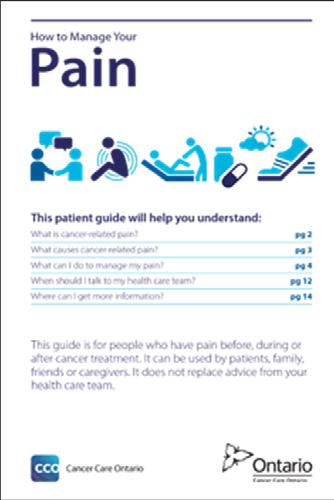
Information in the guides is not medical advice. Please discuss your side effects and symptoms with your Care Team.
Talk to someone in your community who has walked in your shoes and can provide support and guidance. Peers are specially trained; however, this is not a substitute for professional counselling or mental health assistance. It is free and 100% confidential. If you would like to be connected to a peer, ask a member of your Care Team today.

The best medicine doesn’t always come in a bottle - that’s why Look Good Feel Better provides complimentary workshops.
What you’ll experience at a two-hour workshop:
• Information on how to alleviate appearance-related effects of cancer and its treatment, including cosmetic hygiene, sun care, skin care, cosmetics and nail care
• Discussion and demonstrations on hair alternatives
• It’s more than makeup- it’s a safe environment alongside other women dealing with similar issues and challenges.
• Workshops geared toward men are also available, with information on managing skin irritation and shaving, dry skin, hair loss and more.
Register for an online workshop at www.lgfb.ca/en/
Losing hair is one of the most stressful side effects of cancer treatment. There is no best way to deal with hair loss. The best way is the one that is most comfortable. It depends how comfortable you are with baldness and keeping your head warm in cooler weather.
If you would like a wig, the best time to buy one is before you lose any hair, especially if you want a wig that looks like your style and colour. It helps the stylist create the best match. Some women use the chance to try different style and colours.
Many insurance companies pay for a wig when there is a written prescription from your Oncologist.
Some people find that the easiest and most comfortable choices are hats, scarves or turbans. You may have these already, or buy custom items made for people who are getting chemotherapy.
You can visit the Women’s Resource Centre in the Cancer Centre lobby. There you will find a brochure called “Community Resources for Wigs, Hats, Scarves & Turbans.” It has a list of local people and companies who sell these items, should you have coverage. Assistance can be provided for those individuals who do not have coverage. Please ask to speak to a Social Worker.
The Look Good Feel Better Program helps with ways to tie scarves, and ways to make you look and feel better while losing hair during and after chemotherapy. It is a free program held once per month at the Cancer Centre. Ask a member of your Care Team for more information.
• A breast prosthesis is a breast form that can be used after a mastectomy to replace the removed breast. You can use two if you had a double mastectomy.
• A breast prosthesis can help to balance the body and to protect against back and neck pain and a sagging shoulder. It may also help bras and clothing to fit better.
• Breast prostheses come in many shapes, sizes, and materials.
• Assists in helping patients feel “whole” after having one or both breasts removed.
You can visit the Women’s Resource Centre in the lobby of the Cancer Centre. There you will find a brochure called “Community Resources for Breast Prosthesis.” The brochure has a list of local people and companies who sell breast prostheses. They also sell healing kits for after surgery.
Helping with the cost:
The Ministry of Health and Long Term Care through the Assistive Devices Program (ADP) helps people who live in Ontario with the cost.
• You often have to pay the full cost and then will be given back your money by the ADP
• Private Insurance companies may pay for the rest of costs not paid for by the ADP
For more information about ADP, contact: Assistive Devices Program 5700 Yonge Street, 7th Floor Toronto, ON M2M 4K5
1-800-268-6021 www.health.gov.on.ca
This is a free workshop series where participants set goals and action plans, problem solve, improve coping skills, and learn about becoming more active, eating healthier and managing difficult emotions. The program also focuses on managing medications, pain and fatigue, using positive thinking, working with health teams, and making decisions about health. It is available in Windsor-Essex, Chatham-Kent, and Sarnia-Lambton.
For more information, call 1-855-259-3605 or email escsm@wechc.org.
The Wellness Centre at The Hospice offers a variety of programs and services designed to improve your quality of life from the time of pre-diagnosis. From gentle exercise to art and music therapy or support groups, Hospice offers support, education and empowerment along your journey.
Self-referrals are encouraged, so please contact the Wellness Centre today and let the Service Coordinator work with you to build a wellness plan.
For more information, please call 519-974-7100 or visit www.thehospice.ca
Many patients who are getting treatment have trouble understanding which drugs are paid for by the government, drug programs, or private insurance.
Staff in the Pharmacy at the Cancer Centre make sure help with drug costs is considered for each patient. You should tell your Oncologist or Nurse if you have concerns about drug costs. You can also ask a Pharmacist and they too will make sure you get the help you need.
Some patients may be able to get nutrition products paid for by these programs. A Registered Dietitian can help with this. If you are working, check with your employer about benefits and drug cost information.
Working during cancer treatment is a personal decision. When your Care Team looks at whether working during treatment is the best thing for you, they consider some of the following:
• The type of treatment you are getting
• The stage of your cancer
• Your overall health
• The kind of work you do
What you are able to do will depend on how you feel during treatment. Some people with cancer can still go to work and do their usual everyday tasks while they get treatment. Others find that they need more rest or just feel too sick to do much. Your Oncologist may also want you to limit some of your activities.
Be sure to speak with your Care Team about working during treatment and if this is something you would like to do.
The VON Meals on Wheels program delivers fresh, nutritious meals right to your door for a low cost along with a friendly, caring connection through volunteers. This program is available to those receiving cancer treatment.
Meals can be fresh or frozen, with accommodations for chopped, minced, pureed and vegetarian. Visit the following link for information on cost, delivery times in your area or region to place an order.
Find a Meals on Wheels program near you: https://www.eriestclairhealthline.ca/listServices.aspx?id=10107®ion=ErieStClair
The Patient Assistance Fund, generously supported by the Windsor Cancer Centre Foundation, may be able to provide limited short-term emergency financial support to help you during your cancer treatment at the Windsor Regional Cancer Centre. This assistance may be considered once all other community resources have been explored and utilized. If you have an urgent need related to your cancer treatment and require assistance, please ask to speak with a Social Worker by 519-253-5253 to determine eligibility and to learn about additional community resources that may be available to support you.
Cancer patients and their families can get tax deductions for some of the treatment costs. These include things like the cost of parking, travel, finding a place to stay, meals and drugs. The costs can be for the patient and those who go to appointments with them. The amount of help you can get will change over time.
Contact Canada Revenue Agency or visit their website at: www.cra-arc.gc.ca. Search for “medical expenses” to find more information.
The Canada Pension Plan (CPP) retirement pension is a monthly taxable benefit for those who:
• are at least 60 years old
• have made at least one valid contribution to the CPP
You may also qualify for other CPP benefits.
Either the Ontario Works or the Ontario Disability Support Program can help you with costs.
The Ontario Disability Support Program (ODSP) offers:
• Money to help you and your family with living costs
• Help finding and keeping a job, and moving up in your career
• Benefits for you and your family, including prescription drugs, vision care and nutrition products for some patients
A Social Worker at the Cancer Program can tell you more about the help you can get through these programs or you can contact the local Ontario Disability Support Program office.
To learn more:
• Call 1-800-789-4199
• Visit www.mcss.gov.on.ca and click on “Social Assistance”
The Trillium Drug Program is for people who live in Ontario and have a valid Ontario Health Card and have high drug costs compared to how much money they make.
To learn more:
• Call 1-800- 575-5386
• Visit www.health.gov.on.ca and search for “Trillium Drug Program”
When you apply for this program, you are paired up with a CDAP caseworker who will help you learn about all the help you can get with costs in a variety of programs. You and your caseworker will keep in touch until all the possibilities are explored. Speak with your Care Team for more information.
The Non-Insured Health Benefits (NIHB) Program pays for drugs and nutrition products that are not paid for by other private or provincial/ territorial health insurance plans for eligible First Nations and Inuit people.
To learn more:
• Talk with the Indigenous Navigator at the Cancer Program
• Call the Ontario Regional Office at 1-866-225-0709
The ADP is here to help people with long-term physical disabilities pay for customized equipment, like wheelchairs and hearing aids. The ADP also helps cover the cost of specialized supplies, such as those used with ostomies.
• More information: https://www.ontario.ca/page/assistive-devices-program
CPP-D provides disability benefits to people who have made enough contributions to the CPP and who are disabled and cannot work at any job on a regular basis. Benefits may also be available to their dependent children.
• More information: www.canada.ca/en/services/benefits/publicpensions/cpp/cpp-disability-benefit.html
• How to apply: You must apply in writing. Additional information can be found at www.canada.ca/en/services/benefits/publicpensions/cpp/cpp-disability-benefit/apply.html
Through Employment Insurance, you could receive financial assistance of up to 55% of your earnings, to a maximum of $638 maximum as of January 1, 2022. These benefits will help you take time away from work to provide care or support to a critically ill or injured person or someone needing end-of-life care.
• More information: www.canada.ca/en/services/benefits/ei/caregiving.html
An employee-driven charity that provides assistance to families that require support to improve the communities in which we live and work. Recipient must be an individual or family in need of financial assistance related to the types of items supported by Ceridian Cares (clothing, footwear, food and basic household needs, medical, etc.).
• More information: www.ceridiancares.ca • How to apply: www.ceridiancares.ca/application
Provides financial assistance of up to $3,000 per calendar year, per child to help purchase essential mobility equipment such as wheelchair, walkers, ramps or lifts.
More information: www.easterseals.org/services/direct-financial-assistance/
The EI program offers temporary financial assistance to unemployed workers who would otherwise be available to work, but are unable to because of sickness, injury, or quarantine. Eligible individuals could receive up to a maximum of 26 weeks on or after December 18, 2022.
• More information: www.canada.ca/en/services/benefits/ei/ei-sickness.html
Provides a monthly non-taxable benefit to Old Age Security (OAS) pension recipients who have a low income and are living in Canada.
• More Information: www.canada.ca/en/services/benefits/publicpensions/cpp/old-age-security/guaranteed-income-supplement.html
The City of Windsor has developed the Housing Stability Plan (HSP) to provide assistance for rental arrears to avoid eviction.
• More information: www.citywindsor.ca/residents/housing/Housing-with-Supports-and-HomelessnessPrevention/Pages/Rent-and-Utility-Related-Assistance.aspx
An emergency assistance program that provides funding for heat and energy for those who are experiencing financial difficulties and are in receipt of a notice of termination of heating utilities.
Must be a low income family, single and/or senior.
WINDSOR-ESSEX APPLICATION SITES:
• Can-Am Native Non-Profit Homes: 519-977-7782
• Housing Information Services: 519-254-4824
• Unemployed Help Centre: 519-944-4900
• Amherstburg Community Services: 519-736-5471
• South Essex Community Council (Leamington): 519-326-8629
• More information: https://windsoressex.cioc.ca/record/WIN0506
If you’re behind on your electricity or natural gas bill and face having your service disconnected, you may qualify for emergency financial help through the Low-income Energy Assistance Program (LEAP).
• More information: www.oeb.ca/rates-and-your-bill/help-low-income-consumers/low-income-energyassistance-program
A local, volunteer driven organization making a difference in the community through raising money to provide financial assistance to local families and individuals facing a difficult time.
• More Information: www.neighbourhoodcharitablealliance.com/
• How to apply: www.neighbourhoodcharitable alliance.com/give/#need
The Government of Canada’s largest pension program that is funded out of the general tax revenues of the Government of Canada. The OAS pension is a monthly payment available to seniors aged 65 and older who meet the Canadian legal status and residence requirements.
• More information: www.canada.ca/en/services/benefits/publicpensions/cpp/old-age-security.html
The OESP is an Ontario Energy Board (OEB) program that lowers electricity bills for lower-income households. The OESP provides a monthly credit to eligible customers based on household income and household size. The OESP credits are applied directly to eligible customers’ bills.
• More information: https://ontarioelectricitysupport.ca/
• To apply: https://ontarioelectricitysupport.ca/SelfAssessment
Provides a monthly, non-taxable benefit to low-income Ontario seniors. Payments are provided on top of the Old Age Security (OAS) pension and the Guaranteed Income Supplement (GIS) payments you may receive from the federal government. Together, the total maximum benefits from OAS, GIS and GAINS is the guaranteed income level. The Province guarantees that eligible Ontario seniors will have at least this minimum level of income.
• More information: www.ontario.ca/page/guaranteed-annual-income-system-payments-seniors#section-0
The ODB program covers most of the cost of more than 4,400 prescription drug products. You will qualify for the ODB program when you turn 65 years old. Some of you will qualify before you reach that age because you’re:
living in a long-term care home or a home for special care, or
enrolled in one of these programs:
• Home care
• Ontario Works
• Ontario Disability Support Program
• Trillium Drug Program
• OHIP+: Children and Youth Pharmacare
• More information: www.ontario.ca/page/get-coverage-prescription-drugs#section-0
Any permanent resident of Ontario who has a valid health card and has a permanent ostomy or a temporary ostomy for at least six months, may apply for funding under the Assistive Devices Program. The payment is given twice per year.
• More information: www.forms.ssb.gov.on.ca/mbs/ssb/forms/ssbforms.nsf/ (search Ostomy Grant) or call 1-800-268-6021
Disability insurance can help protect you and your family from an unexpected illness or accident that leaves you unable to work and earn an income. Generally, disability insurance replaces between 60% and 85% of your regular income, up to a maximum amount, for a specified time if you temporarily can’t work or are permanently disabled due to an injury or illness.
• More information: www.canada.ca/en/financial-consumer-agency/services/insurance/disability.html
May help with costs when all other possibilities have been explored.
• More information: www.citywindsor.ca (search Social Services) or call 519-255-5200 (Windsor) or 519-946-9988 (Leamington)
Cancer patients and their families can get tax deductions for some things including the cost of parking, travel, finding a place to stay, meals and drugs. The costs can be for the patient and those who go to appointments with them. The amount of help you can get will change over time.
• More information: www.cra-arc.gc.ca (search Medical Expenses) or www.canada.ca/en/financialconsumer-agency/services/caring-someone-ill/tax-credit-caregiver.html
The VA has several financial support options, including: the assistance fund, Canadian Forces income support, several specific benefits (i.e. death, detention), funeral assistance, compensation benefits and additional retirement options.
• More information: www.veterans.gc.ca/eng/services/financial
Windsor Regional Hospital would like to thank the many local businesses/sponsors who made this Guide possible for our patients. Please take a moment to review the following advertisements. You will find an excellent variety of services which may be helpful to you during or following your hospital stay.
Staywell








